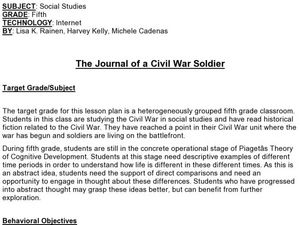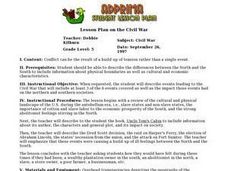Curated OER
Brother Against Brother
Eighth graders read Across Five Aprils and correlate it to a unit on the Civil War. They culminate the unit by writing a a piece of historical fiction in the first person entitled "Brother Against Brother."
Curated OER
On the Homefront: Indiana Family Letters
Students analyze primary source material from the Civil War. They describe the war as it was perceived by those on the homefront in Johnson County, Indiana. Students describe how Hoosiers responded to the draft. They write a document...
Curated OER
"Mill Springs Battlefield"
Students investigate the Civil War caused deep division in the border states and discover the significance of Kentucky to the Union and the Confederacy. They examine how battle casualties were and are honored in the local community.
Curated OER
City Bound
Fifth graders identify the reasons for people migrating to cities after the Civil War. Using population data, they discover why populations in cities rose while rural populations fell during 1860 to 1900. They discuss the impact a...
Curated OER
Lesson Plan: The 1856 Election
High schoolers identify the key issue in the election of 1856, they also identify some of the key people invovled in the election. Students discuss the role of propaganda in politics. Also, high schoolers discuss the significance of the...
Curated OER
Why Did the North Fight?
Students evaluate interpretations of causes for Northern entry into the Civil War by accessing several primary sources.
Center for History and New Media
The Impact of the Jim Crow Era on Education, 1877–1930s
Even though American slaves were officially emancipated in 1865, the effects of slavery perpetuated throughout the 19th and 20th centuries. Middle and high schoolers learn about the ways that discrimination and the Jim Crow laws...
Curated OER
Tension Over Slavery
Eighth graders research the events that lead to the US Civil War. They use the Jigsaw technique to report the findings of their research.
Curated OER
Dispute Over Slavery in Kansas Territory
Students analyze primary sources on slavery from Kansas Territory. In this Civil War lesson, students evaluate the antislavery and pro-slavery arguments and summarize key points. Students write a persuasive paper from the antislavery...
Curated OER
What is the Meaning of This?
Students explore cause and effect and relate it to a historical event. They research the meaning behind the symbols and images used on the Indian Head Cent and the events that were occurring during the time the Indian Head cent was...
Curated OER
Charging into Battle with Hood's Texas Brigade
Seventh graders study the American Civil War and the contributions of Texans to the war effort. They read first-hand accounts of Joseph Polley, member of Hood's Texas Brigade and discuss his account of his first charge and what emotions...
Curated OER
Recruitment
Fifth graders analyze and then draw recruitment posters. In this Revolutionary War instructional activity, 5th graders analyze recruitment posters and discuss the attitude towards African Americans. Students analyze primary documents...
Curated OER
The Journal of a Civil War Soldier
Fifth graders write a response in their journals about the fictional thoughts of a Civil War soldier. They use specific web sites in order to research the life of a soldier during the Civil War.
Curated OER
Lesson Plan on the Civil War
Fifth graders identify events leading to the Civil War and explain the impact the events had on northern and southern societies.
Curated OER
Black Slave Owners in Charleston
Students explore the causes and effects of the Civil War. In this U.S. History lesson, students research the Civil War and the events that happened around it, then share their findings in a paper.
American Battlefield Trust
Southern Secession and Abraham Lincoln’s Presidential Election
President Abraham Lincoln: a true humanitarian or a savvy politician? The lesson focuses on Abraham Lincoln's presidency and the secession of the southern states. Academics interpret how Lincoln's presidential platform promoting African...
Facing History and Ourselves
Defining Freedom
The Emancipation Proclamation freed slaves in the Confederate states. The Thirteenth Amendment banned slavery in the United States. However, neither document defined freedom. The second lesson in the Reconstruction Era series examines...
Facing History and Ourselves
Violence and Backlash
Revolution and counterrevolution. Protest and counter-protest. Collaborators and bystanders. The focus of the fifth resource in the Reconstruction Era and Fragility of Democracy series is on the political violence that followed Radical...
Curated OER
The Kansas-Nebraska Act of 1854: Popular Sovereignty and the Political Polarization over Slavery
Why did Stephen Douglas support the Kansas-Nebraska Act of 1854? Why did Abraham Lincoln oppose it? Young historians examine how the Kansas-Nebraska Act of 1854 affected the political balance between free and slave states and explore how...
Roy Rosenzweig Center for History and New Media
The Revolutionary Times as Seen Through the Eyes of Women
The role of women before and during the American Revolution changed dramatically. To gain an understanding of these changes, middle schoolers analyze primary source documents, including letters from women that supported the patriot cause...
Curated OER
Reporting from the Front Lines
Students examine the battle of Gettysburg as they write news articles. In this Battle of Gettysburg lesson, students become familiar with the job of the news reporter as they report on the events of the Battle of Gettysburg as they write...
Curated OER
Government Lesson Plan: Lesson Plan 9
Young scholars examine and compare/contrast the steps of criminal and civil cases. They define key vocabulary terms, develop an outline of a criminal and civil trial, and analyze the differences in standards of proof in legal cases.
Curated OER
Westward Expansion Unit
Eighth graders investigate the importance of Westward Expansion in the history of the United States in this unit of lessons.
Curated OER
Growing a Nation
Eleventh graders examine the major events and inventions that changed American families and communities. In this US History lesson, 11th graders analyze various documents dealing with the changes. Students create a project on an event...

























